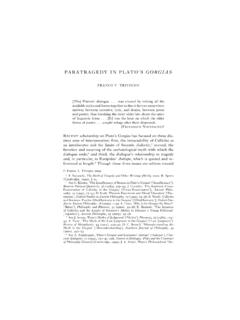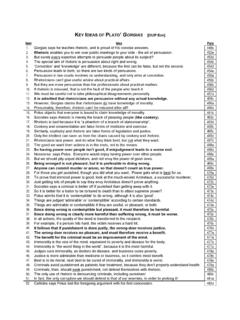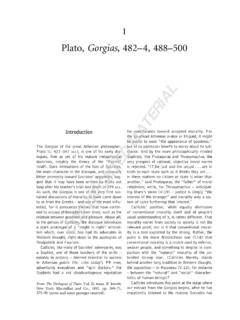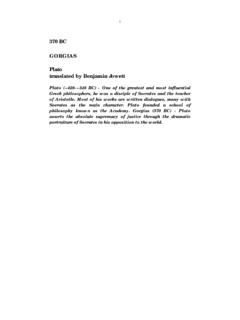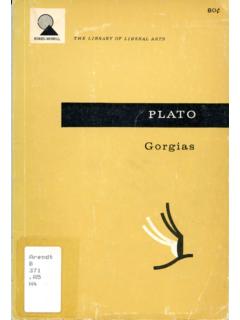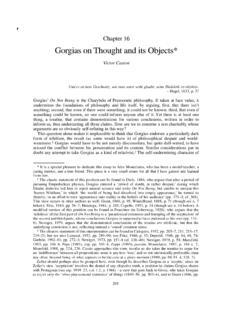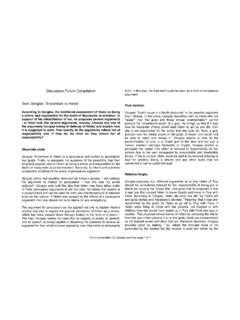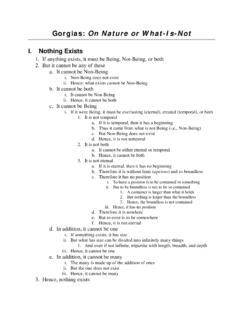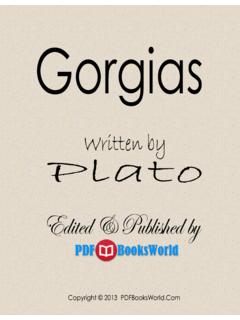Transcription of Plato’s Gorgias Dialogue (from Wikipedia) - Easy Conferences
1 Plato s Gorgias Dialogue ( from wikipedia ) The Dialogue begins just after Gorgias has given a speech. Callicles says that Gorgias is a guest in his home, and has agreed to a private audience with Socrates and his friend Chaerephon. Socrates gets Gorgias to agree to his cross-examination style of conversation, asks him questions, and praises him for the brevity of his replies. Gorgias remarks that no one has asked him a new question in a long time, and when Socrates asks, he assures him that he is just as capable of brevity as of long-windedness (449c). Physical and intellectual combat compared Gorgias admits under Socrates' cross-examination that while rhetoricians give people the power of words, they are not instructors of morality. Gorgias does not deny that his students might use their skills for immoral purposes (such as persuading the assembly to make an unwise decision, or to let a guilty man go free), but he says the teacher cannot be held responsible for this.
2 He makes an argument from analogy: Gorgias says that if a man who went to wrestling school took to thrashing his parents or friends, you would not send his drill instructor into exile (456d 457c). He says that just as the trainer teaches his craft (techne) in good faith, and hopes that his student will use his physical powers wisely, the rhetorician has the same trust, that his students will not abuse their power. Socrates says that he is one of those people who is actually happy to be refuted if he is wrong. He says that he would rather be refuted than to refute someone else because it is better to be delivered from harm oneself than to deliver someone else from harm. Gorgias , whose profession is persuasion, readily agrees that he is also this sort of man, who would rather be refuted than refute another. Gorgias has only one misgiving: he fears that the present company may have something better to do than listen to two men try to outdo each other in being wrong (458b c).
3 The company protests and proclaims that they are anxious to witness this new version of intellectual combat. The debate about rhetoric Socrates gets Gorgias to agree that the rhetorician is actually more convincing in front of an ignorant audience than an expert, because mastery of the tools of persuasion gives a man more conviction than mere facts. Gorgias accepts this criticism and asserts that it is an advantage of his profession that a man can be considered above specialists without having to learn anything of substance (459c). Socrates calls rhetoric a form of flattery, or pandering, and compares it to pastry baking and beautification (cosmetics). He says that rhetoric is to politics what pastry baking is to medicine, and what cosmetics are to gymnastics. All of these activities are aimed at surface adornment, an impersonation of what is really good (464c 465d).
4 An encyclopedia of philosophy articles written by professional philosophers Gorgias (483 375 ) Gorgias was a Sicilian philosopher, orator, and rhetorician. He is considered by many scholars to be one of the founders of sophism, a movement traditionally associated with philosophy, that emphasizes the practical application of rhetoric toward civic and political life. The sophists were itinerant teachers who accepted fees in return for instruction in oratory and rhetoric, and many claimed they could teach anything and its opposite (thesis and antithesis). Another aspect of their method was the ability to make the weaker argument the stronger. The term sophist in classical Greek was a general appellation denoting a "wise man." They were important figures in Greece in the 4th and 5th centuries, and their social success was great.
5 Plato was the first to use the term rh torik , while the sophists termed their "art" logos . Nevertheless, Gorgias is commonly associated with the development of rhetoric in classical Greece. The democratic process in Athens supplied the need for instruction in both rhetoric and philosophy. Despite efforts by Hegel and George Grote toward rehabilitating the reputations of Gorgias and the other sophists in the 19th century, the sophists still had a foul reputation well into the 20th century (as evidenced by the pejorative term "sophistry"). In 1930, French philosopher Jacques Maritain remarked "[s]ophistry is not a system of ideas, but a vicious attitude of the mind;" the sophists "came to consider as the most desirable form of knowledge the art of refuting and disproving by skillful arguments" (32-33). In recent years, however, modernists and post-structuralists have found great value in the philosophy of Gorgias , especially his theories on truth and language.
6 1. Life and Works Gorgias (483-375 ) came to Greece from Leontini in Sicily. Little is known of his life before he arrived in Athens in 427 as a political ambassador seeking military assistance against Syracuse, a city-state in Sicily. He delivered a series of speeches that dazzled the Athenian audiences and won him fame and admiration. Upon completion of his mission, he traveled throughout Greece as a teacher of rhetoric and as an orator, and according to Aristotle, spoke at the Panhellenic festivals (Art of Rhetoric 1414b29). He was a student of Empedocles, and according to Quintilian and others, was the teacher of Isocrates. Plato identifies Meno (Meno 76 Aff) among the students of Gorgias , and he may have been one of Aspasia's instructors as well. Many of the sophists set up schools and charged fees in return for instruction in rhetoric, and Gorgias was no exception.
7 Philostratus (Lives of the Sophists I 9, I) tells us that Gorgias began the practice of extemporaneous oratory, and that he had the boldness to say "'suggest a subject' ..he was the first to proclaim himself willing to take the chance, showing apparently that he knew everything and would trust the moment to speak on any subject." He died at the age of 108 at Larissa in Thessaly. Four works are attributed to Gorgias : On the Nonexistent or On Nature, the Apology of Palamedes, the Encomium on Helen, and the Epitaphios or Athenian Funeral Oration. The original text of On Nature has been lost, and survives only in two different paraphrases, one in Sextus Empiricus' Against the Professors and another in an anonymous work entitled Melissus, Xenophanes, Gorgias . There are two different manuscripts of Palamedes and Helen (the Cripps and Palatine versions), one slightly different than the other.
8 Legal historians consider the Defense of Palamedes to be an important contribution to dicanic [explanatory] argumentation, and some cultural historians believe the Epitaphios was used as a stylistic and genre source for Plato's Menexenus (Cosigny 2). Gorgias ' rhyming style is highly poetic, and he viewed the orator as an individual leading a kind of group incantation. He employs metaphor and figurative expressions to illustrate his assertions, and even uses humor as one instrument of refutation. The term macrologia (using more words than necessary in an effort to appear eloquent) is sometimes used to describe his oratorical technique (Kennedy 63). 2. Philosophy Any student of Gorgias must immediately mark the distinction between his philosophy as expressed by Plato in the Dialogue Gorgias (see below) and his philosophy found within the three works: On the Nonexistent, the Apology of Palamedes, and the Encomium on Helen.
9 A. Ontology & Epistemology Nowhere is Gorgias ' sophistical love of paradox more evident than in the short treatise On the Nonexistent or On Nature. The subject of this work is ontological (concerning nature of being), but it also deals with language and epistemology (the study of the nature and limitations of knowledge). In addition to this, it can be understood as an exercise in sophistical rhetoric; Gorgias tackles an argument that is seemingly impossible to refute, namely that, after considering our world, we must come to the conclusion that "things exist." His powerful argument to the contrary proves his abilities as a master of oratory, and some believe the text was used as an advertisement of his credentials. Gorgias begins his argument by presenting a logical contradiction, "if the nonexistent exists, it will both exist and not exist at the same time" ( ) (a violation of the principle of non-contradiction).
10 He then denies that existence (to on) itself exists, for if it exists, it is either eternal or generated. If it is eternal, it has no beginning, and is therefore without limit. If it is without limit, it is "nowhere" ( ), and hence does not exist. And if existence is generated, it must come from something, and that something is existence, which is another contradiction. Likewise, nonexistence (to m on) cannot produce anything ( ). The sophist then explains that existence can neither be "one" (hen) or "many" (polla), since if it were one, it would be divisible, and therefore not one. If it were many, it would be a "composite of separate entities" ( ) and no longer the thing known as existence. Gorgias then turns his attention to what is knowable and comprehensible. He remarks, "if things considered [imagined or thought] in the mind are not existent, the existent is not considered" ( ), that is to say, existence is incomprehensible.
